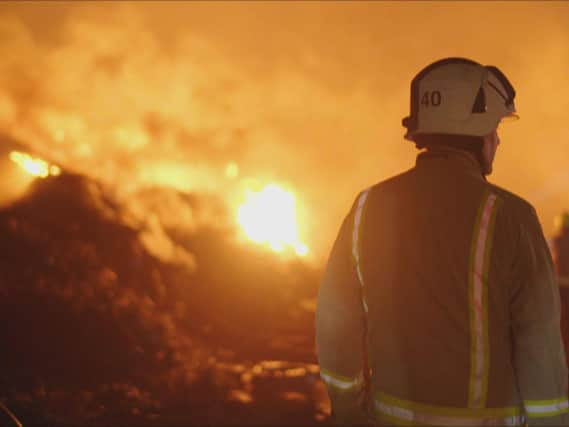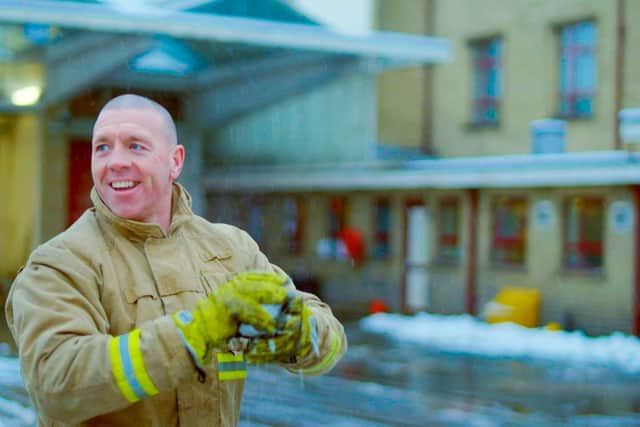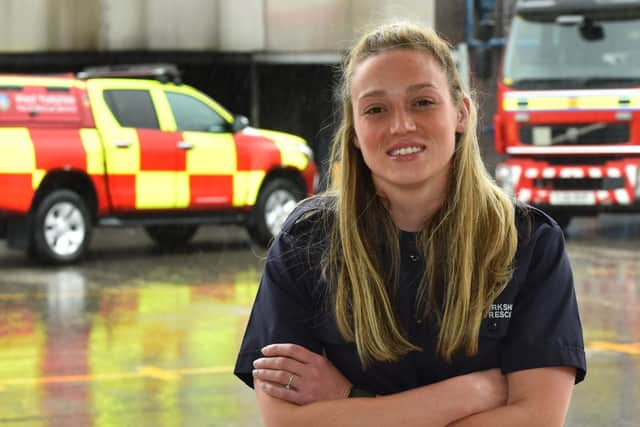Yorkshire Firefighters talk about new BBC Two documentary and why colleagues are 'family'


Saving a life beats scoring a try any day of the week – just ask firefighter Shane Byrne.
The former rugby league player for his hometown team Huddersfield Giants swapped his jersey and mouthguard for a hard hat and hose in 2002, and hasn’t looked back since.
Advertisement
Hide AdAdvertisement
Hide AdNow crew commander Byrne and his colleagues feature on Yorkshire Firefighters, made by the Leeds-based Wise Owl Films, factual label of Lime Pictures, as it airs on BBC Two.


The four-part series, which begins tonight, is a rare chance to go behind the scenes with a selection of West Yorkshire Fire and Rescue Service’s 900 crew members as they keep their communities safe during the pandemic.
Filmed using latest technology and helmet cameras, viewers will get up close to real emergencies and inside burning buildings, often in remote, dangerous and life-threatening situations.
But these events bring firefighters together, says Byrne, 42.
Advertisement
Hide AdAdvertisement
Hide Ad“The one thing about this job is that every single shift is different, every single fire call you get is different. They can be similar, but no fire call’s ever the same.


“So that variety, you can’t beat it. And especially my watch, Green Watch at Huddersfield, you’re like a family – that’s the best way to describe it. Sometimes you fall out, but most of the time, you’re just like brothers and sisters.
“It’s just one big family. You have such a laugh it’s untrue, and not many people can say that – not many people can go to work, and say they’ve had such a good time and such a laugh,” he says.
“Obviously it’s got its downsides. We do go to quite a lot of serious incidents, as you can imagine. Sometimes they’re publicised on TV. So they’re not nice. And a lot of people ask me, from time to time, you know, ‘How do you cope as an individual and as a watch?’
Advertisement
Hide AdAdvertisement
Hide Ad“It may seem bizarre but it’s true – the power of laughter. Even if you’ve been to the most serious incident, obviously as a watch you’re down, as an individual you feel down for a bit. But then that camaraderie, that laughter the banter, slowly comes back and before you know it you’re laughing again. Even though in the back of your mind, you’re still thinking about the incidents you’ve been to, it’s just that power of laughter. You can’t beat it.”
Unlike many of his colleagues, firefighting was not the childhood dream that rugby league was to him as a young man.
“For me it was a last minute total change of career path. Things had started going wrong at my club, at the Giants. I kind of fell out of love with the game at quite a young age, really, at 22.
And at the time, the fire service were recruiting, and I was just looking for something different. I knew a few people in the job, and they said: ‘Well if rugby’s not for you anymore, do you fancy this?’. And I thought, yeah go on then I’ll give it a go.”
Advertisement
Hide AdAdvertisement
Hide AdHe adds: “It filled a pretty big void in my life at the time because, like I said, I’d had enough of rugby, I just thought, right, what else can I do? I’d done it (rugby) from school, from like 15, 16, so I had no other life skills as such, no trades behind me. Luckily with the fire service, anyone can get in. You train from scratch all the way through to riding the fire engine, so literally anybody can get in.”
Over nearly two decades, Byrne has worked at stations in Illingworth, Wakefield and Huddersfield, but it was during his early days that perhaps his most memorable call-out came.
“I had a bit of a cliché baptism of fire within my first three months when I was at Illingworth, so I was in my probation period. I went to probably one of the biggest fires West Yorkshire’s seen, a massive mill fire at Boothtown at Halifax back in 2003.
“I think there was the best part of 30 to 35 fire engines at it, it was huge,” he says.
Advertisement
Hide AdAdvertisement
Hide Ad“We were the first fire engine to it. Me and the leading firefighter were wearing breathing apparatus, we were the first to go in.
“And as you can imagine it could be quite hairy. Red hot, zero visibility, we couldn’t find the fire. And before we knew it the leading firefighter was calling us out because it was getting too dangerous.
“And we withdrew, thank God.”
It was the right call, he says, because within an hour the fire had ripped through the multi-storey mill and out the roof.
“So that’s probably one of the main jobs I remember, even though it was 18 years ago.”
Advertisement
Hide AdAdvertisement
Hide AdThe show features a call-out to a similarly huge incident – a tyre blaze in Bradford in November last year, said to be one of the city’s biggest in years.
Mark Robinson, creative director at Wise Owl Films, says: “It was a real privilege to follow West Yorkshire’s firefighters during a difficult winter and a global pandemic, and to see their role at the heart of the community – the same communities many come from themselves.
"Not only will viewers get to see footage – captured by helmet cameras – that plunges them into the heart of very dangerous scenarios, they will also see day-to-day life within the stations, behind closed doors.”
In terms of the pandemic’s effect on the job, father-of-three Byrne says this has mostly impacted community work such as school visits.
Advertisement
Hide AdAdvertisement
Hide AdOne message he wishes to get across is to people using fireworks irresponsibly and those starting bin fires. “They don’t realise that they’re taking a valuable resource away from that community for a period of time, even if it’s 10 to 15 minutes. Anything can happen during that 10 to 15 minutes.”
He adds: “Unfortunately, a few times over the years we’ve been to minor fires or false alarms and something very, very serious has happened at the exact same time.”
Like Byrne, Leeds woman Lauren Nicholls came to firefighting after a different career.
She was a PE teacher at a school in Wakefield but wanted “a more active job, bit more hands-on,” she says.
Advertisement
Hide AdAdvertisement
Hide Ad“I just wanted something a bit more mentally and physically challenging.”
The show features the 28-year-old as a trainee firefighter, a process she completed in December. She works at the Hunslet station, close to where she grew up, and says: “As a kid I drove past Hunslet fire station and I always wanted a fire engine to come out as I drove past with my parents. It’s a really good feeling to be working in the area and feel a bit more connected to it.”
She says that one of her most memorable jobs, which is on the programme, was during flooding when a panicked couple was trapped in a car.
What is it like when you have helped to rescue people in those situations?
Advertisement
Hide AdAdvertisement
Hide Ad“Oh, it’s...it’s hard to explain that feeling but it’s like a sense of relief that the property or the person is okay, but at the same time you’re kind of proud of yourself in a way.
“That was another reason I wanted to join – to make a difference in the community. It’s a really rewarding job.”